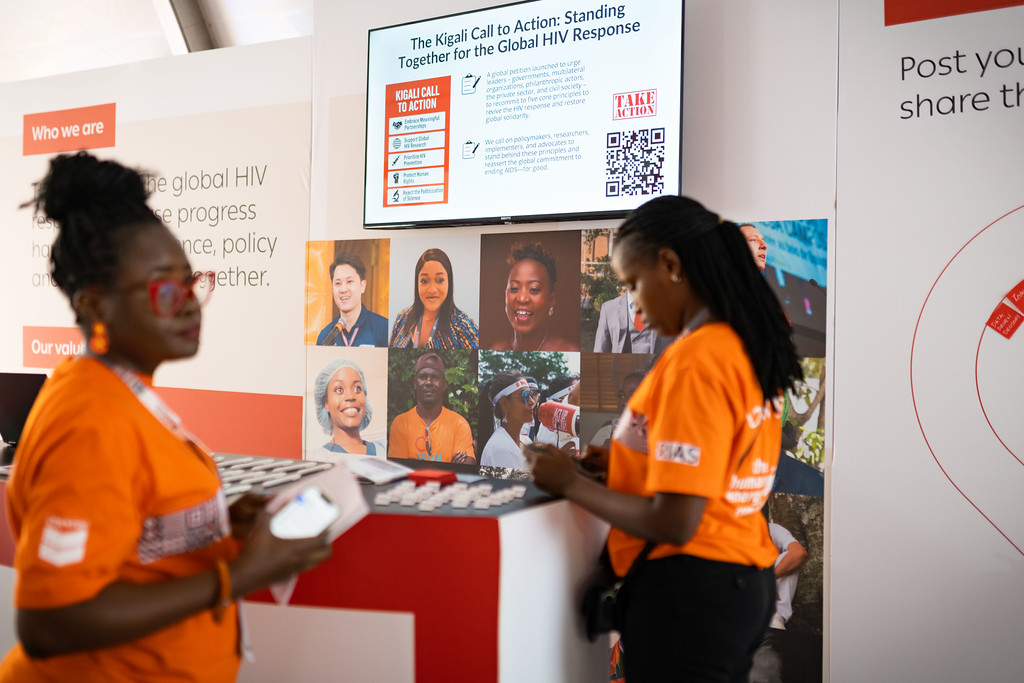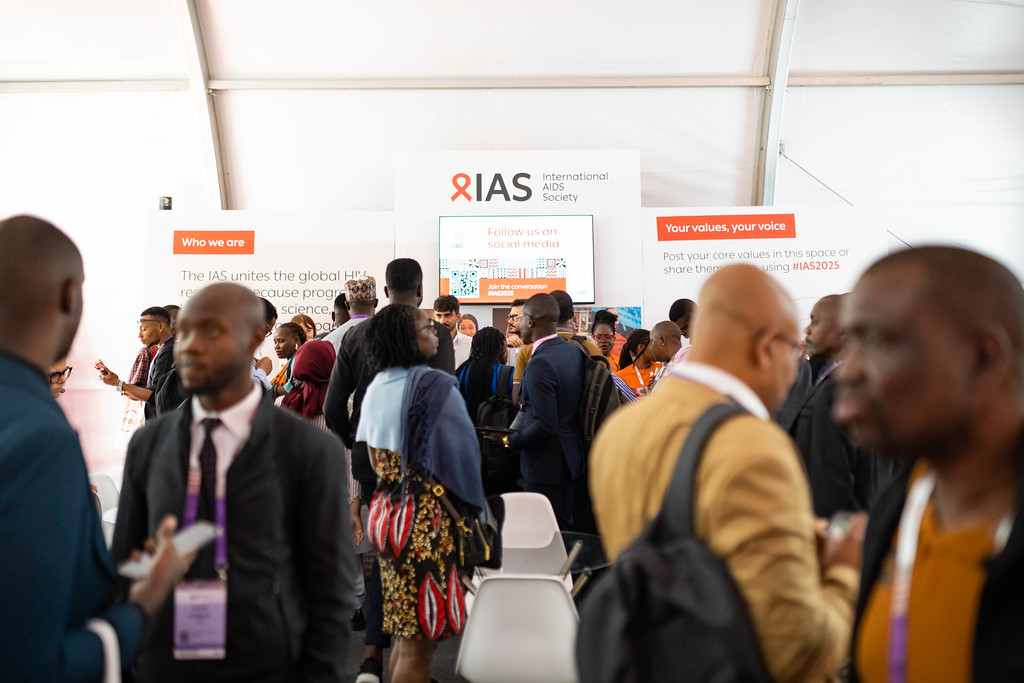Hope for Uganda, rest of Africa as global AIDS fund PEPFAR survives Trump knife
Vought noted that the President was willing to accept the amendment, which would preserve the initiative originally launched by President George W. Bush in 2003. If the Senate adopts the amendment, the total rescissions package will amount to $9 billion.
IAS President Dr Beatriz Grinsztejn
By John Musenze
Journalists @New Vision
KIGALI - The decision by the US government to preserve funding for the President’s Emergency Plan for AIDS Relief (PEPFAR) has brought a sigh of relief to Uganda, other low- and middle-income countries (LMICs) that are heavily dependent on the programme for HIV/AIDS prevention, treatment and care.
On July 15, 2025, US Office of Management and Budget Director Russell Vought told reporters after meeting with Senate Republicans that the White House supported a substitute amendment to the rescissions package that would exempt PEPFAR—the global anti-AIDS initiative—from funding cuts.
Vought noted that the President was willing to accept the amendment, which would preserve the initiative originally launched by President George W. Bush in 2003. If the Senate adopts the amendment, the total rescissions package will amount to $9 billion.
“There is a substitute amendment that does not include the PEPFAR rescission, and we’re fine with that,” Vought said, according to online sources.
“It’s substantially the same package, and the Senate has to work its will. We’ve appreciated the work along the way to get to a place where they’ve got the votes.”
The amendment means the House of Representatives will have to vote again on the legislation.
“It’s not the Green New Deal,” Vought added. “There’s money that’s been around for a long time that we can repurpose for what is needed.”
A matter of life and death for Uganda
In Uganda, where over 1.5 million people are living with HIV, the decision is a matter of life and death.
“The preservation of PEPFAR funding is a major victory for Uganda’s public health,” Uganda's health ministry public health commissioner Dr Daniel Kyabayinze, said.
“This programme has been the backbone of our HIV/AIDS response for two decades.”
PEPFAR has saved 26 million lives over the past two decades, and protecting it could save millions more. (Courtesy Photo)
Since its inception in Uganda in 2004, PEPFAR has invested over $3 billion (about shillings 10.7 trillion, going by the current exchange rate) into the country’s HIV response through supporting treatment, prevention, and the strengthening of health systems.
With this funding, more than 742,000 HIV-positive Ugandans are currently receiving antiretroviral therapy (ART), six million pregnant women were tested for HIV last year alone, and nearly half a million men have undergone circumcision for HIV prevention.
Uganda’s progress towards the global UNAIDS 90-90-90 targets—90% of people living with HIV knowing their status, 90% of those diagnosed receiving sustained ART, and 90% of those on treatment achieving viral suppression—has largely been enabled by consistent PEPFAR support, according to the US Embassy in Uganda official website.
A fragile reality exposed
However, the recent threats of funding cuts exposed the fragility of Uganda’s health programmes and served as a wake-up call.
“The suspension and uncertainty surrounding PEPFAR taught us many lessons,” Kyabayinze noted.
“We realised how dependent we are on external funding. When rumours of cuts began circulating, patients were worried. Staff morale dropped in some centres. It created an environment of fear and unpredictability, but the health ministry has and is handling it very well.”
During the months when disbursements were suspended and funding approvals delayed, service delivery slowed. Health facilities experienced stockouts of essential supplies, including HIV test kits and antiretroviral drugs.
Community outreach and prevention campaigns were scaled back. Programmes supporting orphans, vulnerable children, and adolescent girls were disrupted, according to Flavia Kyomukama, the executive director and founder of the National Forum of PLHA Networks in Uganda.
For Gloria Nawanyaga, an HIV advocate and a person living with HIV, the US government's decision to restore PEPFAR funding is personal.
“This isn’t just aid, it’s my life,” she says.
The antiretroviral drugs she takes, the youth support groups she leads, and the community clinics she champions all trace back to PEPFAR’s impact. “Without it, many of us would be lost,” Gloria adds. Gloria said the renewal affirms global solidarity, restores hope, and protects dignity.
“It tells us we matter—and that the world hasn’t given up on us.”
Previously, the US mission in Uganda announced new funding routes where all budgets will be through the mission after the official closure of USAID.
“The impact of even the threat of withdrawal was severe,” added Kyabayinze.
“We were forced to reprogram parts of our domestic health budget and pause low-priority activities. It challenged us to think about how to make our HIV response more sustainable but the health integration has been successfully implemented and it had closed the funding cuts gaps.”

Turning crisis into opportunity
In the face of this challenge, the Ministry of Health and its implementing partners began strategic rethinking. Officials are now discussing how to build resilient systems that are not wholly dependent on donor aid.
“We are starting to invest in domestic resource mobilisation,” said Kyabayinze. “We are also working with civil society and the private sector to explore new financing models, including public-private partnerships for long-term HIV care.”
He added that the near-loss of PEPFAR support has accelerated Uganda’s efforts to integrate HIV services into the broader health care system—aiming to make it more efficient and less reliant on external support.
“All services were integrated, it saves us a lot, we do not plan to stop the integration even when PEPFAR funding is restored because we have it bear fruits in a short period of time” Kyabayinze added.
With the reinstatement of full PEPFAR funding, key prevention efforts such as voluntary medical male circumcision and mother-to-child transmission prevention will now continue without interruption to full scale even though it was never stopped by the ministry.
Uganda has already achieved considerable success in these areas, with the HIV positivity rate among exposed infants dropping from 12% in 2010 to just 5.3% in 2015.
“We are grateful to the American people and Congress for preserving this lifeline. But now is the time to also invest in sustainability,” Dr Kyabayinze said. “Let’s work together to build a future where Uganda can manage its HIV response independently, with robust systems and empowered communities.”
IAS welcomes US decision
The International AIDS Society (IAS) has also welcomed the US Senate’s decision to remove PEPFAR from the proposed cuts, describing the move as critical to global health.
“The science is clear: PEPFAR has saved 26 million lives over the past two decades, and protecting it could save millions more,” IAS president Dr Beatriz Grinsztejn, speaking from Kigali, Rwanda, at the 13th IAS Conference on HIV Science (IAS 2025), said.
IAS President-Elect, Prof. Kenneth Ngure, stressed the importance of the decision for Africa: “PEPFAR is a lifeline for communities across Africa. Restoring this funding means hope for people living with and affected by HIV. But African leadership must remain central to shaping our response. We also need to keep advancing conversations about sustainable financing—including stronger domestic investments and strategies to reduce reliance on global donors.”
The IAS has called for swift action to protect essential HIV services and urged global leaders to continue investing in initiatives that save lives and support health systems.
By the time of this publication, we were unable to get a comment from the US Mission in Uganda.
